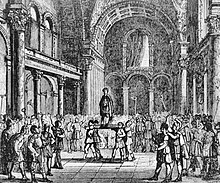360
(Redirected from AD 360)
| Millennium: | 1st millennium |
|---|---|
| Centuries: | 3rd century – 4th century – 5th century |
| Decades: | 330s 340s 350s – 360s – 370s 380s 390s |
| Years: | 357 358 359 – 360 – 361 362 363 |
| Gregorian calendar | 360 CCCLX |
| Ab urbe condita | 1113 |
| Assyrian calendar | 5110 |
| Balinese saka calendar | 281–282 |
| Bengali calendar | −233 |
| Berber calendar | 1310 |
| Buddhist calendar | 904 |
| Burmese calendar | −278 |
| Byzantine calendar | 5868–5869 |
| Chinese calendar | 己未年 (Earth Goat) 3056 or 2996 — to — 庚申年 (Metal Monkey) 3057 or 2997 |
| Coptic calendar | 76–77 |
| Discordian calendar | 1526 |
| Ethiopian calendar | 352–353 |
| Hebrew calendar | 4120–4121 |
| Hindu calendars | |
| - Vikram Samvat | 416–417 |
| - Shaka Samvat | 281–282 |
| - Kali Yuga | 3460–3461 |
| Holocene calendar | 10360 |
| Iranian calendar | 262 BP – 261 BP |
| Islamic calendar | 270 BH – 269 BH |
| Javanese calendar | 242–243 |
| Julian calendar | 360 CCCLX |
| Korean calendar | 2693 |
| Minguo calendar | 1552 before ROC 民前1552年 |
| Nanakshahi calendar | −1108 |
| Seleucid era | 671/672 AG |
| Thai solar calendar | 902–903 |
| Tibetan calendar | 阴土羊年 (female Earth-Goat) 486 or 105 or −667 — to — 阳金猴年 (male Iron-Monkey) 487 or 106 or −666 |

360 (CCCLX)
was a leap year starting on Saturday of the Julian calendar, the 360th year of the Common Era (CE) and Anno Domini (AD) designations, the 360th year of the 1st millennium, the 60th year of the 4th century, and the 1st year of the 360s decade. As of the start of 360, the Gregorian calendar was
1 day ahead of the Julian calendar, which was the dominant calendar of the time. At the time, it was known as the Year of the Consulship of Constantius and Iulianus (or, less often, year 1113 Ab urbe condita).
Events[change | change source]
By place[change | change source]
Roman Empire[change | change source]
- February – Julian, Roman Caesar, is proclaimed emperor by the Gallic legions in Lutetia (modern Paris) at the Thermes de Cluny. They refuse to support the eastern campaign against king Shapur II of Persia and revolted.
- The Alamanni raid Raetia (Switzerland), but are pushed back behind the Rhine and into the Black Forest by Julian.
- King Shapur II continues his campaign against the Roman fortresses. His armies capture Singara, Bezabde and Nisibis.
- Emperor Constantius II and Julian send several letters to each other. They are both hoping to avoid a civil war.
Europe[change | change source]
- Thousands of Huns invade Europe. They spread terror as they take over territories held for generations by Alans, Heruls, Ostrogoths and Visigoths.
Asia[change | change source]
By topic[change | change source]
Agriculture[change | change source]
- Roman authorities in Britain export wheat to supply the legions on the Rhine. They have encouraged production of wheat for that purpose.
Religion[change | change source]
- First Council of Constantinople: Emperor Constantius II requested a church council, at Constantinople, and both the eastern and western bishops attend the meeting. Wulfila also attends the council and endorses the resulting creed. After the council, several homoiousian bishops are deposed or banished, including Macedonius I of Constantinople and Cyril of Jerusalem.
Births[change | change source]
- John Cassian, Desert Father and Christian saint (approximate date)
- Saint Mesrob, Armenian monk and theologian (approximate date)
- Saint Ninian, missionary to Scotland (approximate date)
- Tao Sheng, Chinese Buddhist scholar (approximate date)
- Wang Fahui, empress during the Jin Dynasty (d. 380)
Deaths[change | change source]
- Eustathius of Antioch, Patriarch of Antioch (approximate date)
- Murong Jun, emperor of the Former Yan (b. 319)
